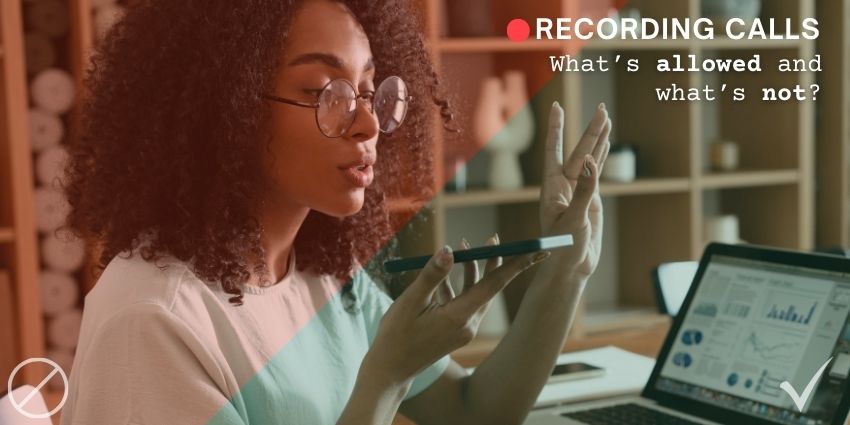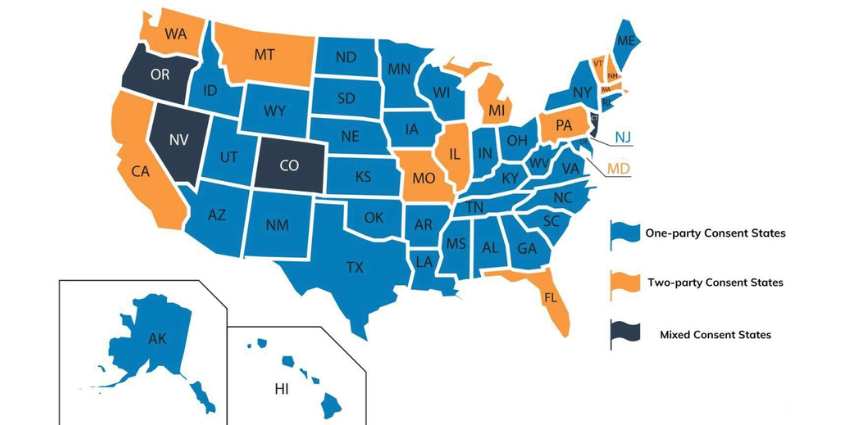
Have you ever found yourself in need of recording your audio communication to have a record, a verbatim transcript, or to use as a reference? Whether you’re a journalist conducting an interview, you’re hosting a client or an employee meeting, a virtual lecture, or a board meeting, you might find yourself in need of recording audio communication.
Something to consider- there are both federal and state laws, rules and regulations so to speak, around recording calls, specifically when it comes to consent.
Are you allowed to just hit record on a call without the other person or people on the call knowing they’re being recorded, or do you need to ask permission? Is it implied that you’re going to record? What if the others don’t know you’re there and you hit record? Is that allowed?
There isn’t a black and white answer, but we’ll do our best to explain the murky waters around recording conversations.
Consent
The first concept to understand is around consent.
In other words, do you need to be given permission to hit the record button, without facing a consequence?
● One-party consent: This means any one person participating on the call needs to give consent for the call to be recorded. That person can be you, so in this case you do not need to ask anyone else for permission to record, as your consent is enough.
● Two-party and Multi-Party consent: This means you are required to tell the other person on the call (two-party), or all the other people (multi-party) if there are more than two of you, that you’re recording the call for one reason or other.
In Practice: Whether you need one-party, two-party or multi-party consent largely depends on where you live in the world.
● For example, in Australia, you are not allowed to record calls. In Canada, you’re allowed to record if you have consent from each party, and you also must state the intention of your recording.
● Meanwhile, in some European countries like Italy and Poland, you’re not required to let anyone know you’re recording the conversation.
What About the United States?
Again, this answer is: “it depends”.
It depends where you live.
State Law Versus Federal Law
State laws vary from state-to-state, with the vast majority of states requiring one-party consent, and the minority of states requiring two-party consent or multi-party consent.
Some two-party consent states, for example, include California, Washington, Montana, Illinois, Michigan, Pennsylvania and Florida.
Check out this map to familiarize yourself with the law in your specific state:

Federal law, on the other hand, states that you require just one-party consent. In this sense, the USA is a one-party consent entity.
● However, there is an important caveat: You need to be part of the conversation. In other words, you can’t record if you’re not participating in the call (or if others don’t know you’re there), this essentially becomes illegal eavesdropping or wiretapping. This applies to wherever you live in the United States.
In short, federal law is the standard, however, if the state law where you live is more strict than the federal law (i.e. if the state you’re in requires two or multi-party consent), then this more strict law trumps the less strict federal law.
Some More Murky Waters
Just to add to the confusion, there are also a couple other states worth noting:
● Vermont: It doesn’t have a statute at all about recording calls.
● Oregon: It requires two-party consent for in-person communication; however, such is not the case if you’re recording virtually.
● Connecticut: It requires consent for virtual electronic recordings; however, in person, you do not need to ask permission to record.
Rule of thumb: Double check any and all nuances for the state if you’re at all concerned about breaking the rules.
Three Tips to Keeping you Out of Trouble
Air on the Side of Caution and Ask for Consent
Regardless of the state laws, it does get tricky if things were to go to court, in terms of the legality of the situation. Our best tip is simply to ask for consent regardless of where you are just to play it safe.
This is especially true when it comes to recording a call when you’re talking to someone or other people in other states. Technically if you’re recording from a state that does not require two-party consent, you should be good to go, but just to be safe, ask for consent in the above situation.
Worst case scenario, you’re slapped with a lawsuit, a fine, given a misdemeanor, or charged with a crime, which is simply all the more reason to be cautious and ask for consent. As an individual, a fine is likely to be as mundane as $500, but there have been cases where large companies didn’t obtain consent from their customers to record calls and as a result, they had to pay millions in penalties.
What if Consent is Not Given?
As a journalist who does a lot of Zoom calls, there were a handful of times in the past where my source looked uneasy when I asked if I could record the call. But as I dug into it, it was generally because they didn’t feel camera ready.
The moment I reassured them the call was just being recorded for audio accuracy so I could avoid mis-quoting them—and that the video or audio wasn’t leaving my desktop—they relaxed and gave me permission to record.
The point is, let the person or people on the call know why you’re recording. Maybe it’s for accuracy, maybe it’s because it’s a board meeting that requires carefully taken
minutes, or maybe it’s because you’re doing a call with a nutrition client and want to make sure you have a good recording of all that is discussed to give them the best possible advice moving forward.
Generally, when you have a good reason, those being recorded will see it’s in their best interest to provide consent.
Let Technology Help
It makes it a lot easier to ask for consent (and to have a record of this consent) if you use Zoom or Google Meets or some other phone recording apps, as you can arrange your settings so that the app prompts each person coming onto the call to acknowledge and give consent that the call will be recorded.
Generally speaking, people are used to clicking accept to these types of requests, which makes your life easier as you’ll avoid any type of push back about recording.
Further, should there be a problem you now have evidence that goes beyond just your word that each person gave you permission to record.
Tip: If you’re not using technology that does the latter, it might be worth sending an email or text message prior to the call asking for consent so you have a record of their compliance (especially if the subject matter is sensitive).
The Bottom Line: Though in a lot of cases, you can go ahead and hit record without letting anyone on a call know, as a general rule it’s always best to tread with caution and be up front and honest about the fact that you’re recording the call and what the recording will be used for. If people understand the reason and the value behind the recording, they will likely take no issue.
The takeaway: When it comes to recording communication of all types, that old saying, Ask for forgiveness, not permission, just isn’t true.
Oh, and maybe don’t go hiding a microphone during the call or placing a hidden video…Just saying.

